
Stories of the Week... Toon of the Week... Quote of the Week... Graphic of the Week... SkS in the News... Photo of the Week... SkS Spotlights... Coming Soon on SkS... Climate Feedback Reviews... SkS Week in Review... Poster of the Week...

In Northern Europe, this summer feels like a modern-day version of the biblical plagues. Cows are dying of thirst in Switzerland, fires are gobbling up timber in Sweden, the majestic Dachstein glacier is melting in Austria.
In London, stores are running out of fans and air-conditioners. In Greenland, an iceberg may break off a piece so large that it could trigger a tsunami that destroys settlements on shore. Last week, Sweden’s highest peak, Kebnekaise mountain, no longer was in first place after its glacier tip melted.
Southern Europe is even hotter. Temperatures in Spain and Portugal are expected to reach 105-110 degrees Fahrenheit this weekend. On Saturday, several places in Portugal experienced record highs, and over the past week, two people have died in Spain from the high temperatures, and a third in Portugal.
But in the northernmost latitudes, where the climate is warming faster than the global average, temperatures have been the most extreme, according to a study by researchers at Oxford University and the World Weather Attribution network.
Scorching Summer in Europe Signals Long-Term Climate Changes by Alissa J. Rubin, World, New York Times, Aug 4. 2018
The Trump administration Thursday pushed ahead with plans to unravel the federal government’s most effective action to fight climate change — aggressive fuel economy standards aimed at getting the nation’s cars and trucks to average more than 50 miles per gallon by 2025.
After months of discussion and drafts, the Environmental Protection Agency and the National Highway Traffic Safety Administration formally unveiled their plan to rewrite those rules and replace them with ones so lax that even automakers are wary.
The administration’s plan would freeze mileage targets in 2020 for six years. It would also move to end California’s power to set its own, tougher greenhouse gas emissions standards and nullify the state mandate that automakers sell a specified number of electric vehicles.
EPA officials sought to portray the proposal as the administration’s opening bid in a negotiation with California. State officials, however, loudly denounced the plan as too extreme and threatened to fight it in court. California and the 13 other states that follow its more stringent rules argue the Clean Air Act empowers them to keep the Obama-era standards in place in their markets.
California vows to fight Trump EPA's move to freeze fuel economy rules by Elvan Halper, Tony Barbosa & David Lauter, Los Angeles Times, Aug 2, 2018
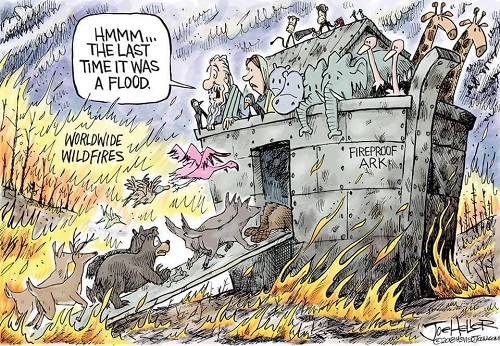
Hat tip to Moms Clean Air Force Facebook page.
“In the past, we had this kind of heat wave once every 10 years, and now we have them every two years or something like that,” said François-Marie Bréon, a climatologist and deputy director of the Laboratory of Climate and Environmental Science, a research institute affiliated with France’s National Center for Scientific Research. “That’s really the sign of climate change: We have heat waves that aren’t necessarily more intense but that are more and more frequent.”
Scorching Summer in Europe Signals Long-Term Climate Changes by Alissa J. Rubin, World, New York Times, Aug 4. 2018
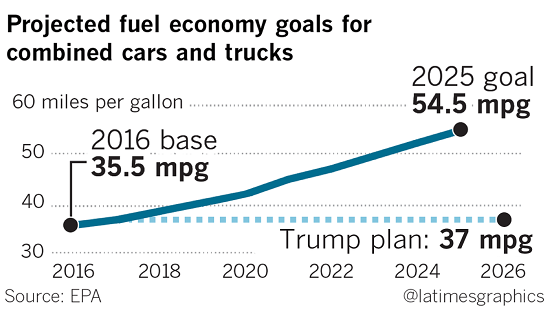
California vows to fight Trump EPA's move to freeze fuel economy rules by Elvan Halper, Tony Barbosa & David Lauter, Los Angeles Times, Aug 2, 2018
John Cook is extensively quoted by Shannon Osaka in her Grist article,A climate denial video has 6 million views. Facebook doesn’t care. posted on July 31, 2018. The lead quote:
John Cook, who focuses on climate misinformation as a professor of cognitive science at George Mason University, says he hasn’t heard of the social media giant flagging any climate denial content. “Facebook’s fact-checking algorithms are a bit of a black box,” he tells Grist via email. (The social media site did not respond to a request for comment.)
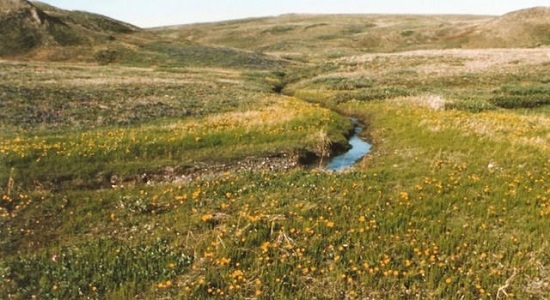
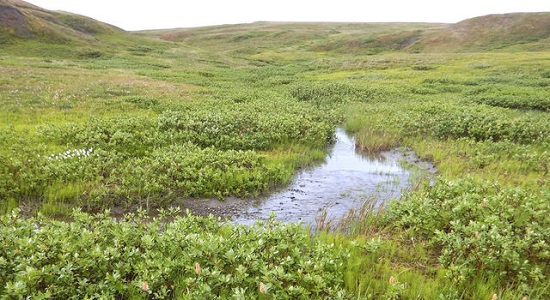
Arctic carbon cycle is speeding up by Esprit Smith, Vital Signs of the Planet, NASA's Jet Propulsion Laboratory, Aug 3, 2018
The purpose of CoalSwarm is to create shared information for the worldwide citizens’ movement seeking to address the impacts of fossil fuels and move to cleaner sources of energy. The Global Coal Plant Tracker has information on 13,000 existing and proposed coal plants worldwide. The CoalWire newsletter is a global weekly news digest. The CoalSwarm portal on SourceWatch contains over 9,000 wiki articles providing a constantly expanding reference. FrackSwarm provides a reference on oil and gas, including hundreds of major pipelines and LNG (liquified natural gas) terminals. CoalSwarm’s reports can be found here.
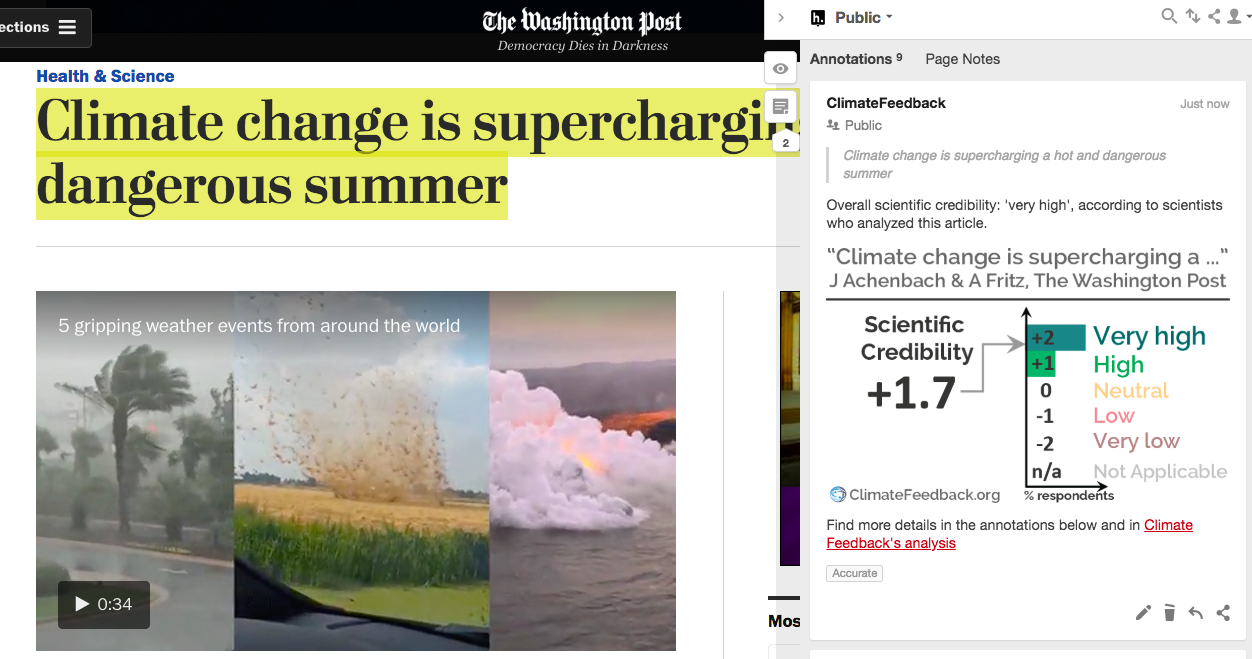
Climate Feedback asked a team of scientists to review the article, Climate change is supercharging a hot and dangerous summer by Angela Fritz & Joel Achenbach, Health & Science, Washington Post, July 26, 2018
Three scientists analyzed the article and estimate its overall scientific credibility to be 'very high'.
A majority of reviewers tagged the article as: Accurate.
Review Summary
This story in The Washington Post lists a variety of extreme weather events seen around the Northern Hemisphere recently. The article explains that some of these types of weather are known to be connected to human-caused climate trends.
Scientists who reviewed the article found that this scientific context was accurately provided. Heatwaves and intense rainstorms, for example, are increasing in severity and frequency. Some weather patterns—like slow-moving meanders in the jet stream—are indeed less clear and consequently subjects of active research.
Washington Post story puts recent weather extremes in accurate climate change context, Edited by Scott Johnson, Climate Feedback, July 31, 2018
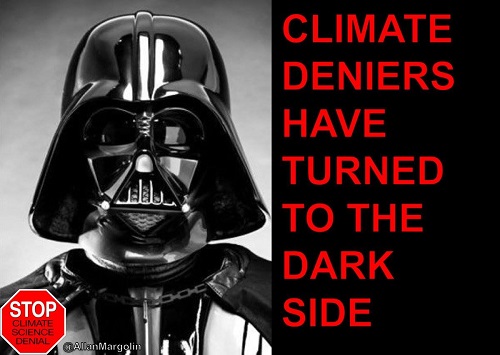
Posted by John Hartz on Sunday, 5 August, 2018
 |
The Skeptical Science website by Skeptical Science is licensed under a Creative Commons Attribution 3.0 Unported License. |